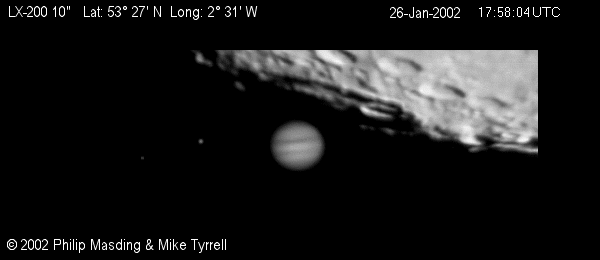Difference between revisions of "August 2, 2004"
| Line 28: | Line 28: | ||
<p><b>Technical Details:</b><br> | <p><b>Technical Details:</b><br> | ||
10" Meade LX200 telescope with JVC digital video camera. Each frame based on approx 20 frames stacked and highly processed - see [http://www.astrospider.com/jupiter_graze_occultation.htm Mike's web page] for details. Note that the animation speeds up the graze 50 times normal speed.</p> | 10" Meade LX200 telescope with JVC digital video camera. Each frame based on approx 20 frames stacked and highly processed - see [http://www.astrospider.com/jupiter_graze_occultation.htm Mike's web page] for details. Note that the animation speeds up the graze 50 times normal speed.</p> | ||
| − | <p><b>Tomorrow's LPOD:</b> Still on the Limb</p> | + | <p><b>Yesterday's LPOD:</b> [[August 1, 2004|Another Day, Another Success]] </p> |
| + | <p><b>Tomorrow's LPOD:</b> [[August 3, 2004|Still on the Limb]] </p> | ||
</tr> | </tr> | ||
</table> | </table> | ||
Revision as of 13:54, 1 February 2015
Jupiter Graze
Image Credit: Mike Tyrrell |
|
Jupiter Graze The Moon is huge - in our sky. This is brought home every time any other planet is in the same eyepiece field with Luna. On January 26, 2002, Jupiter grazed the Moon's southeast limb, at least as seen from Mike Tyrrell's backyard in the United Kingdom. Working with his colleague Phillip Masding, Mike constructed this animation which beautifully documents the sliding of the Moon past Jupiter and two of its moons. The large crater above Jupiter at the beginning of the animation is Bailly. Look very closely at Jupiter and you will see two or three mountains projected in silhouette as the Moon grazes the planet. These are the Doerfel Mountains which were named by Schroeter in the late 1700s. This name was dropped from the Moon's official nomenclature because the exact identification of the peaks is difficult. They appear to be high spots on the rims of Bailly, Hausen and the Atiken-South Pole Basin. A movie of a grazing occultation of a planet is an excellent way to explore the limb. Technical Details: Yesterday's LPOD: Another Day, Another Success Tomorrow's LPOD: Still on the Limb |
Author & Editor: |
COMMENTS?
Register, and click on the Discussion tab at the top of the page.
Contributions to http://www2.lpod.org/ are licensed under a Creative Commons Attribution No-Derivative-Works Non-Commercial 3.0 License. 




